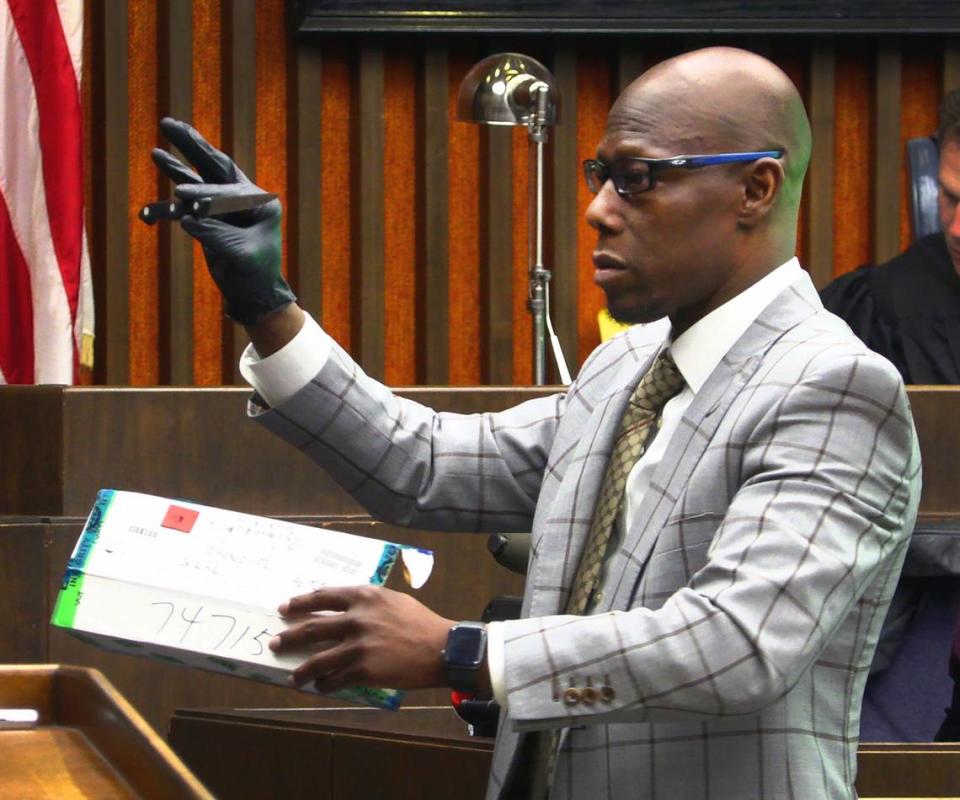Jury reaches verdict in racially motivated attack on Columbus store worker
The jury has reached a verdict in the trial of Jayvon Rayshawn Hatchett, accused of stabbing a white Columbus AutoZone worker in an attack driven by reports of police violence against Blacks.
The jury found Hatchett guilty of aggravated assault, and of using a knife to commit a felony, in the attack on store worker Michael Hunt.
Superior Court Judge John Martin sentenced Hatchett to the maximum penalty: 20 years in prison for aggravated assault, plus five years on the weapons offense.
The judge said he found no “mitigating factors” in the case that would justify a lesser sentence.
“It’s clear the intent was to kill Mr. Hunt,” he said of the unprovoked assault that he called “a very cowardly and dastardly act.”
Hatchett walked into the store on Aug. 25, 2020, and asked Hunt about an auto part before stabbing him seven times as Hunt turned his back. He persisted in the assault as Hunt begged him to stop.
Hatchett later told police he attacked the first white person he saw after viewing videos related to the police shooting of a Black man, Jacob Blake, in Kenosha, Wis. He pleaded not guilty by reason of insanity.
The jury started deliberating at 4:30 p.m. Thursday, and announced it had a verdict two hours later.
Because of Hatchett’s insanity defense, jurors had four verdict options: guilty, guilty but mentally ill, not guilty, or not guilty by reason of insanity.
Hatchett did not deny stabbing Hunt, and admitted his motivation when police arrested him the next day.
His attorney, public defender Steve Craft, told jurors in his closing argument Thursday that the question jurors had to answer was not whether Hatchett knew attacking Hunt was wrong.
“We all know stabbing someone is wrong,” he said.
The question was whether Hatchett was so deluded at the time that he felt compelled to stab Hunt anyway, he said, arguing testimony from a defense expert showed Hatchett was suffering paranoid delusions that drove him to act on his impulse.
“I believe that we have met our burden,” he said.
Hunt’s injuries left him in a wheelchair, unable to work and in constant pain.
His wife, Denise Hunt, testified Thursday that he once worked up to 50 to 60 hours a week, before the stabbing. Now he can’t drive and remains at home. He can’t go anywhere without “several bottles of medication,” she said.
“I have to watch him cry in pain every day,” she testified. “My husband did not deserve this.”

Did he have a mental illness?
The defense witness was forensic psychologist Christina Gliser, who found Hatchett had a schizoaffective disorder related to bipolar depression, and acted under paranoid delusions regarding conspiracy theories involving the Freemasons and so-called “illuminati,” believing they targeted Black men.
But a psychologist testifying for the prosecution, John Parmer, said Hatchett was concocting “rare and bizarre symptoms” of mental illness that became increasingly detailed and ostentatious, after his arrest.
Hatchett claimed that he saw horns protruding from Hunt’s head during the attack, and that he’d seen ghosts and other illusions when he was a child.
In his closing argument, District Attorney Stacey Jackson told jurors Hatchett knew what he did was wrong, because he ran from the AutoZone on 950 32nd St. after the stabbing. He washed Hunt’s blood off the steak knife when he got home and burned the clothes he was wearing.
That proved he was conscious of his guilt, Jackson said: “He burned the clothes to destroy evidence and hide the crime.”
He noted that Hatchett endured hardships as a child, when he was abused by an alcoholic father and his family was occasionally homeless. But, he said, Hatchett made good grades and graduated high school, with no documented mental health issues.
Hatchett did not claim to be mentally ill until after his arrest, Jackson said: “It’s a bunch of baloney. It’s fabricated.... He’s guilty, period. He’s not insane.”

Murder charge pending
Hatchett still has a murder case pending in the later death of a white cellmate in the Muscogee County Jail, which authorities also claim was racially motivated.
Hatchett, who was 19 at the time, is accused of killing 39-year-old Eddie Nelson Jr., on Sept. 5, 2020, when a corrections officer saw Hatchett kneeling on Nelson with his hands around Nelson’s neck.
Nelson could not be resuscitated and was pronounced dead from strangulation around 2:30 a.m., authorities said.
Hatchett faces life in prison if convicted of murder.
Nelson’s death led to a federal lawsuit against the city government, as his family has claimed jail workers were negligent in allowing Hatchett to be housed with white inmates. The suit claims the jail staff were “deliberately indifferent” to the risk Hatchett posed, in violation of the 14th Amendment.
The lawsuit currently is on appeal to the 11th Circuit Court of Appeals.

